Office of Research & Development |
 |

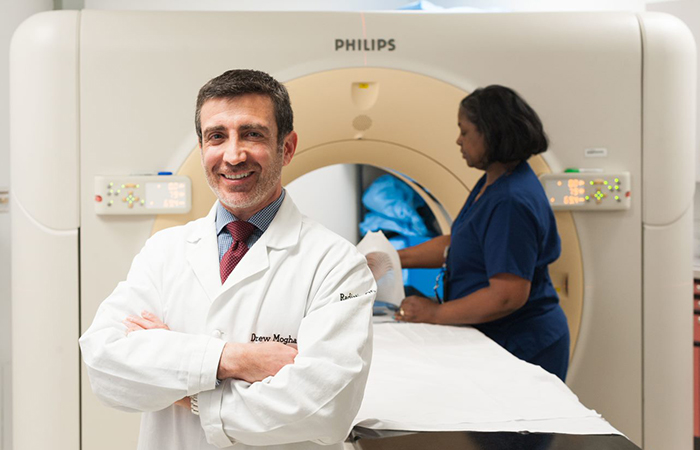
Dr. Drew Moghanaki is a lung cancer specialist who today serves as section chief of radiation oncology at the Atlanta VA Health Care System. In the background is Glenda Campbell, chief radiation therapist at Hunter Holmes McGuire VA Medical Center in Richmond, Virginia. (Photo courtesy of Richmond VA)
July 17, 2020
Erica Sprey
VA Research Communications
"Early screening is the single biggest thing that has hit lung cancer."
Navy Veteran Jim Pantelas has spent the last 15 years working to fund new lung cancer research, combat patient stigma, and improve care for lung cancer patients. His mission is personal: He is a survivor of stage 3 lung cancer, with stage 4 lymph node involvement.
Working together with the Lung Cancer Alliance, now part of the GO2 Foundation for Lung Cancer, Pantelas frequently finds himself on Capitol Hill lobbying to increase funding for lung cancer research and early detection programs.
"Early screening is the single biggest thing that has hit lung cancer in forever. You can talk all you want about immunotherapies that are available for lung cancer, and they are wonderful. But they only treat 15% of the lung cancer population," says Pantelas.
With lung cancer screening programs, physicians are catching more cancer earlier, when it is still treatable, says Pantelas. Historically, he notes, most lung cancers were caught at stage 4, when treatment options were limited.
Some 900,000 Veterans are at risk of developing lung cancer due to older age, a history of smoking, and environmental exposures during or after military service. Each year, VA diagnoses 7,700 Veterans with lung cancer.
"In my era, Agent Orange was a given," says Pantelas. "If you served a day in Vietnam and you got lung cancer, it was [presumed to be related to Agent Orange]. But it took 20 years to get there."
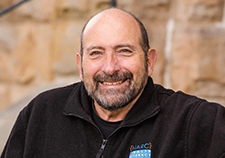
Navy Veteran Jim Pantelas is a patient advocate and 15-year lung cancer survivor. (Photo courtesy of CureToday.com)
VA has partnered with the GO2 Foundation to increase awareness about lung cancer screening and to improve outcomes for Veterans affected by lung cancer. The partnership will allow VA to share Veteran-centric information and resources via the foundation's 750 Screening Centers of Excellence.
The GO2 Foundation developed a set of criteria for assessing screening programs in the earliest days of lung cancer screening, according to Pantelas. They created a Center of Excellence designation for high-quality screening programs, and developed a set of guidelines to ensure that lung cancer screening was practiced in a safe, precise, and equitable way, calibrating low-dose computed tomography (CT) scanners to uniform levels.
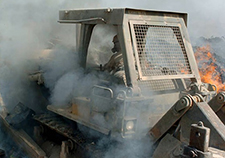
VA Study Documents Health Risks for Burn Pit Exposures
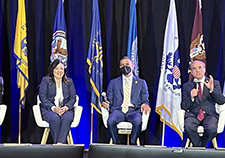
Under Secretary of Health, panel of experts discusses PACT Act impacts for Veterans
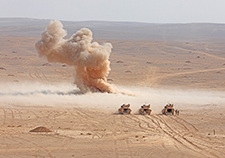
Veteran interest in Gulf War Illness reflected in new research study
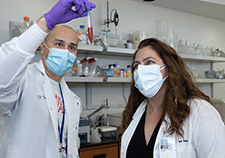
Research roundup: E-cigs aren't safe
"The VA-GO2 Foundation partnership will help expand the array of services that are currently available within VA,"said VA Secretary Robert Wilkie in a press release. "It will also increase public awareness about Veteran-specific conditions that place Veterans at greater risk for lung cancer."
The GO2 Foundation was founded by patients and survivors to help transform the lives of people who have survived cancer. An important mission of the foundation is to increase funding for public and private lung cancer research.
Laurie Fenton, president and CEO of the GO2 Foundation, has been working to increase access to lung screening for Veterans for more than a decade. In 2012, her work with the former Under Secretary of Health Robert Petzel led to the establishment of the VA Lung Cancer Screening Demonstration Project.
Based on the U.S. Preventive Services Task Force recommendations on annual lung cancer screening, the project examined the feasibility of starting a screening program in a large integrated health care system, like VA.
In 2017, the project concluded that lung screening using low-dose CT scans is an important component of care for Veterans at high risk of lung cancer. The researchers noted that wide-spread implementation in a clinical setting would require further study.
Veterans often hold misconceptions about the benefits of screening for lung cancer, according to research. VA investigators in Seattle conducted a study that examined Veterans' perceptions about smoking and cancer screening. Nearly half of respondents incorrectly said that lung screening could reduce their risk of getting lung cancer.
This research underscores the need for well-defined messaging for Veterans on the benefits of screening for early detection of lung cancer, said the researchers. "Our results illustrate just how wide a gap exists between the expectations and the reality of lung cancer screening benefits among some groups of current smokers."
Growing out of earlier work, VA clinicians developed the VA Partnership to Increase Access to Lung Screening (VA-PALS) demonstration project. The program is an enterprise wide initiative that entails a collaboration between the VA Office of Rural Health, Bristol-Myers Squibb Foundation, and the International Early Lung Cancer Action Program.
Today, VA-PALS encompasses 10 VA medical centers across the country and is standing up a cloud-based management system to track Veterans who have undergone lung cancer screening.
Dr. Drew Moghanaki is a VA lung cancer specialist and section chief of radiation oncology at the Atlanta VA Health Care System. He is the principle investigator for VA-PALS, and has been an early collaborator with the GO2 Foundation.
There are a number of ways that the VA partnership with the GO2 Foundation can help Veterans, according to Moghanaki.
"The GO2 Foundation can help VA deliver its message about the importance of lung screening to Veterans throughout the U.S.," he says. "This can be done via co-branded messaging and by committing GO2 resources to host public information about VA's commitment to lung cancer on their website."
Education will also play a major role in the GO2-VA collaboration, says Moghanaki. The GO2 Foundation is prepared to invite VA clinicians to participate in their online learning networks and educational webinars. Together with VA-PALS, GO2 is planning to host a virtual workshop for VA clinicians in the fall.
The GO2 Foundation is also ready to work with the VA Office of Community Care to help Veterans identify high-quality screening centers if they choose to seek care in the community.
Lung cancer is the leading cause of cancer-related deaths in the U.S., according to the American Cancer Society. One reason is that patients with early stage lung cancer don't typically experience significant signs of disease. In Pantelas' case, his lung cancer was diagnosed by a rheumatologist at an advanced stage, because he was experiencing bone and joint pain.
Early lung screening can be a game changer, says Pantelas. "We have 140,000 deaths a year from lung cancer, and we are really happy that it's down into the 140s," he notes. "Three years ago, it was 157,000 deaths. A big part of that is earlier detection through screening programs."
VA Research Currents archives || Sign up for VA Research updates